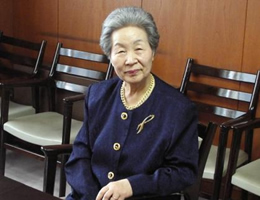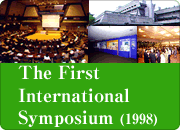President, Kagawa Nutrition University
Yoshiko Kagawa
Born in Tokyo in 1931.
Graduated from Tokyo Women’ s Medical University.
Obtained a PhD from the Graduate School of Medicine, The University of Tokyo.
Studied Home Economics at the University of California Graduate School.
Opened the Nutrition Clinic at the Kagawa Nutrition Institute for Education.
Taught at Kagawa Nutrition University.
President, Kagawa Nutrition University

My mother, who was a medical doctor and founded Kagawa Nutrition University, was from Motomiya, Wakayama Prefecture. She and my father met at the Shimazono Clinic of Internal Medicine at Tokyo Imperial University and married one year before I was born. My parents were doing research into beriberi that had inflicted so many people at the time and seemed incurable that Japan was considered a sickened country. With the help of my father, my mother launched the Katei Shokuyo Kenkyukai (the predecessor of the university today). During my junior high school days, the war grew and I ended up spending everyday making balloon bombs at a factory feeding the war effort.
Two months before war’s end, I evacuated, Gunma Prefecture, where I lost my father. With little room other than to concern myself with continuing my studies, I enrolled in medical school. After graduating, I did research into the metabolism of iron at graduate school and later studied manganese deficiency while abroad, but I was very worried about the future of Japan when I saw the obesity problems during my studies in the USA.
Once back in Japan, I decided to work at my mother’s university where I opened a nutrition clinic to test the“KNU diet” (diet in which foods are divided into 4 groups and one watches one’s weight by eating a balanced diet and counting calories) that my mother conceived. I have continued with that ever since. Obesity leads to diabetes and other dreadful diseases. Moreover, the Japanese and other peoples of Asia whose main staple is rice, especially Well-milled rice, readily incur vitamin B1 deficiency and beriberi, because Well-milled rice cut the vitamin B1 content to 1/4 of Well-milled rice with embryo. It is a very wasteful eating habit. Therefore, I recommend them to eat Well-milled rice with embryo.
I am truly excited that, gracious of everyone’s efforts, this international symposium is being held in my mother’s native land of Wakayama. I hope to convey to the people of Wakayama the importance of directly improving one’s eating habits through the citizens’ forum and other venues.
| Hobbies: | Photography. I particularly enjoy taking pictures of friends in a natural state and giving photos to them. |
|---|---|
| In Wakayama: | I’d like to see Tanabe and other places of my mother’s past, but I am very much looking forward to the direct encounters with the people at the citizens’forum. |





